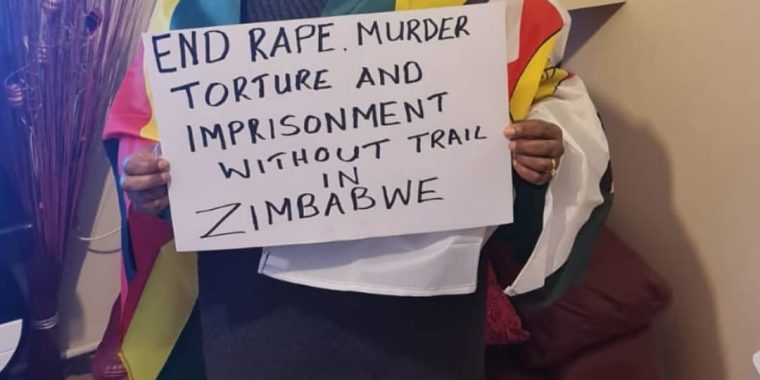
https://www.flickr.com/photos/zimbabwevigil/50604550502/sizes/m/
The Mozambiquan government has appealed for international assistance following new attacks by militants who have pledged allegiance to the extremist Islamic State group (see: https://www.herald.co.zw/zim-ready-to-assist-in-stamping-out-mozambique-insurgency/).
Armed militants chanting ‘Allahu Akbar’ (God is greatest) are reported to have set homes alight in a village, where a football pitch was turned into an execution ground and people beheaded. More than 50 people are said to have been killed in the area.
Several thousand people have been killed since the insurgency in the Cabo Delgado province began in 2017 with hundreds of thousands fleeing the area, where there has been discontent over government neglect.
Cabo Delgado, bordering Tanzania, has Africa’s largest energy project with a US$58 billion liquified natural gas programme. But even with the support of Russian and South African mercenaries, the government has not been able to halt Islamist attacks. In September they burnt down a holiday lodge frequented by international celebrities (see: https://www.arise.tv/mozambique-government-calls-for-help-as-more-than-50-beheaded-by-jihadists/).
The Crisis in Zimbabwe Coalition has called for leadership by the African Union and SADC in the fight against the extremists. The AU, however, has been unable to do much to stem the spread of Islamic State jihadists down from the Sahel region through Mali to other West African countries, becoming a major scourge in northern Nigeria.
The Vigil doubts that SADC has the will to stem the IS advance down from Somalia through Kenya and Tanzania to Mozambique. The regional organisation is a hollow shell and the South African leadership is preoccupied with domestic issues.
Butt the Islamist threat is at Zimbabwe’s borders and Mnangagwa has no option but to help our close ally Mozambique. The question is can he avoid repeating Mugabe’s self-interested DRC disaster?
Many would agree that, instead of reinforcing our police state, Zimbabwe’s soldiers could be better employed contributing to a regional military force. But who would lead it while South Africa is otherwise engaged?
This leaves only the United Nations. It would certainly expect French support, given that the French Total company is investing heavily in the Mozambiquan gas project. The UK could also help as it has given a billion pound loan to the project. The United States has already indicated willingness to help.
Now how about Zimbabwe’s all-weather friend China? It has shown a readiness to deal with Muslim dissidents without much criticism from the Islamic world. It sees itself as a global leader and could show this by joining a UN force to stem this threat to Africa.
Other Points:
- About the time three years ago when Islamic terrorist violence became serious in Mozambique, the Zimbabwe Education Minister Lazarus Dokora made the surprising assertion that Islam was the biggest religion in Zimbabwe when it became independent, followed by Judaism and Hinduism with Christianity in fourth place! He said he had obtained a loan of $20 million from the Organisation of Petroleum Exporting Countries to build the first 17 of 2,000 Muslim schools. We don’t know what happened about the schools but we have a good idea of what happened to the money . . . (see Vigil diary of 08/04/2017).
- Because of the coronavirus we can no longer physically meet outside the Zimbabwe Embassy in London, so we have a virtual Vigil while the restrictions continue. We ask our activists to put on Vigil / ROHR / Zimbabwe regalia and take a photo of themselves holding an appropriate poster reflecting our protest against human rights abuses in Zimbabwe. The photos are uploaded on our Flickr site: https://www.flickr.com/photos/zimbabwevigil/albums/72157716896362632. Our virtual Vigil activists today were Esther Munyira, Rosemary Maponga, Patience Bakasa and Rudo Takiya who all kindly contributed to Vigil funds.
- For Vigil pictures check: http://www.flickr.com/photos/zimbabwevigil/. Please note: Vigil photos can only be downloaded from our Flickr website.
Notices:
- The Restoration of Human Rights in Zimbabwe (ROHR) is the Vigil’s partner organization based in Zimbabwe. ROHR grew out of the need for the Vigil to have an organization on the ground in Zimbabwe which reflected the Vigil’s mission statement in a practical way. ROHR in the UK actively fundraises through membership subscriptions, events, sales etc to support the activities of ROHR in Zimbabwe. Please note that the official website of ROHR Zimbabwe is http://www.rohrzimbabwe.org/. Any other website claiming to be the official website of ROHR in no way represents us.
- The Vigil’s book ‘Zimbabwe Emergency’ is based on our weekly diaries. It records how events in Zimbabwe have unfolded as seen by the diaspora in the UK. It chronicles the economic disintegration, violence, growing oppression and political manoeuvring – and the tragic human cost involved. It is available at the Vigil. All proceeds go to the Vigil and our sister organisation the Restoration of Human Rights in Zimbabwe’s work in Zimbabwe. The book is also available from Amazon.
- Facebook pages:
Vigil: https://www.facebook.com/zimbabwevigil
ROHR: https://www.facebook.com/Restoration-of-Human-Rights-ROHR-Zimbabwe-International-370825706588551/
ZAF: https://www.facebook.com/pages/Zimbabwe-Action-Forum-ZAF/490257051027515
Post published in: Featured









 Jordan Rothman is a partner of
Jordan Rothman is a partner of 






